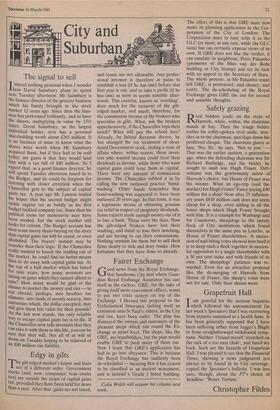Edgy in gilts
The gilt-edged market's hopes and fears are of a different order. Government stocks (and, now, companies' loan stocks too) are outside the scope of capital gains tax, provided they have been held for more than a year. After that, gains are not taxed, and losses are not allowable. Any profes- sional investor is therefore at pains to establish a loss (if he has one) before that first year is out, and to take a profit (if he has one) as soon as seems sensible after- wards. This exercise, known as 'notching', does much for the turnover of the gilt- edged market, and much, therefore, for the commission income of the brokers who specialise in gilts. What, ask the brokers apprehensively, if the Chancellor tops their notch? What will pay the school fees? Already, by Inland Revenue decree, he has changed the tax treatment of short- dated Government stock, ending a state of affairs where, within reason, those inves- tors who wanted income could treat their dividends as income, while those who want capital gains could treat them as capital. There went any amount of commission income. The Chancellor rubbed it in by calling the new outlawed practice 'bond- washing'. Older hands remember that bond-washing was supposed to have been outlawed 20 years ago. In that form, it was a legitimate means of obtaining genuine tax relief in respect of imaginary dividends. Some experts made enough money out of it to buy a bank. Those were the days. Now the gilt-edged brokers have lost their washing, and stand to lose their notching, and are having to cut their commissions. Nothing remains for them but to sell their firms dearly to rich and dozy banks. How fortunate that they have done so already.


















































 Previous page
Previous page